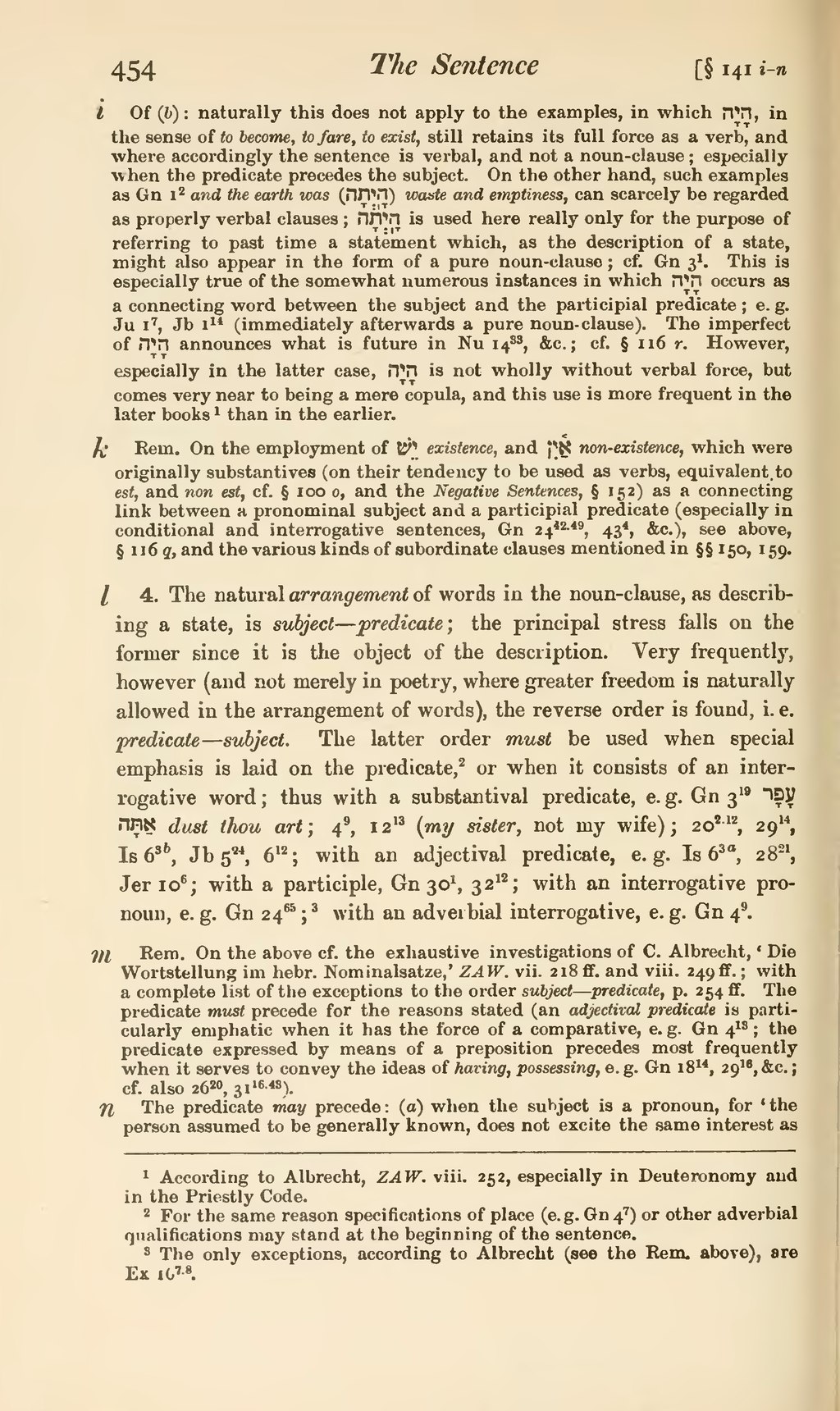[i] Of (b): naturally this does not apply to the examples, in which הָיָה, in the sense of to become, to fare, to exist, still retains its full force as a verb, and where accordingly the sentence is verbal, and not a noun-clause; especially when the predicate precedes the subject. On the other hand, such examples as Gn 1 and the earth was (הָֽיְתָה) waste and emptiness, can scarcely be regarded as properly verbal clauses; הָֽיְתָה is used here really only for the purpose of referring to past time a statement which, as the description of a state, might also appear in the form of a pure noun-clause; cf. Gn 3. This is especially true of the somewhat numerous instances in which הָיָה occurs as a connecting word between the subject and the participial predicate; e.g. Ju 1, Jb 1 (immediately afterwards a pure noun-clause). The imperfect of הָיָה announces what is future in Nu 14, &c.; cf. § 116 r. However, especially in the latter case, הָיָה is not wholly without verbal force, but comes very near to being a mere copula, and this use is more frequent in the later books[1] than in the earlier.
[k] Rem. On the employment of יֵשׁ existence, and אַ֫יִן non-existence, which were originally substantives (on their tendency to be used as verbs, equivalent to est, and non est, cf. § 100 o, and the Negative Sentences, § 152) as a connecting link between a pronominal subject and a participial predicate (especially in conditional and interrogative sentences, Gn 24, 49, 43:4, &c.), see above, § 116 q, and the various kinds of subordinate clauses mentioned in §§ 150, 159.
[l] 4. The natural arrangement of words in the noun-clause, as describing a state, is subject—predicate; the principal stress falls on the former since it is the object of the description. Very frequently, however (and not merely in poetry, where greater freedom is naturally allowed in the arrangement of words), the reverse order is found, i.e. predicate—subject. The latter order must be used when special emphasis is laid on the predicate,[2] or when it consists of an interrogative word; thus with a substantival predicate, e.g. Gn 3 עָפָר אַתָּה dust thou art; 4:9, 12:13 (my sister, not my wife); 20:2, 12, 29:14, Is 63 b, Jb 5, 6; with an adjectival predicate, e.g. Is 63 a, 28:21, Jer 10; with a participle, Gn 30, 32; with an interrogative pronoun, e.g. Gn 24;[3] with an adverbial interrogative, e.g. Gn 4.
[m] Rem. On the above cf. the exhaustive investigations of C. Albrecht, ‘Die Wortstellung im hebr. Nominalsatze,’ ZAW. vii. 218 ff. and viii. 249 ff.; with a complete list of the exceptions to the order subject—predicate, p. 254 ff. The predicate must precede for the reasons stated (an adjectival predicate is particularly emphatic when it has the force of a comparative, e.g. Gn 4; the predicate expressed by means of a preposition precedes most frequently when it serves to convey the ideas of having, possessing, e.g. Gn 18, 29, &c.; cf. also 26:20, 31:16, 43).
[n] The predicate may precede: (a) when the subject is a pronoun, for ‘the person assumed to be generally known, does not excite the same interest as
- ↑ According to Albrecht, ZAW. viii. 252, especially in Deuteronomy and in the Priestly Code.
- ↑ For the same reason specifications of place (e.g. Gn 4) or other adverbial qualifications may stand at the beginning of the sentence.
- ↑ The only exceptions, according to Albrecht (see the Rem. above), are Ex 16, 8.
